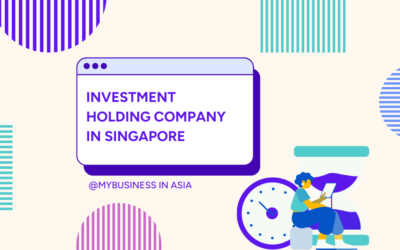
Singapore’s legal system, safe banking structure, appealing tax policies, geographical ease of global expansion, and business-friendly policies, make it an ideal place to set up a holding company that expands overseas from Singapore.
Over the years, the holding structure became one of the most popular setups that businesses operate in Singapore, as this structuring offers various advantages for your business.
Key aspects to understand the Company Framework
A holding company, also known as the “parent” or the “umbrella” company, is a legal entity that usually does not conduct business but owns shares or assets in other companies.
All business operations are carried out by its subsidiary companies. The parent company can access the resources of its subsidiaries and benefit from their profits, and it is not affected by the liabilities of the subsidiaries. A company will be defined as a subsidiary, if more than 50% of its ownership are owned by the parent company.
A Singapore Holding Company is the one that is registered in Singapore. Meanwhile, its subsidiaries and assets do not necessarily reside in Singapore.
Taxation and other Benefits of setting up a Holding Company in Singapore
Singapore has a well-known attractive tax system for companies. Holdings that settle there can benefit from a variety of tax incentives, such as the single-tier corporate tax system, foreign-income tax exemption, double-tax treaties, no capital gains tax, dividends tax-exemption and so on. Knowing more about taxation in Singapore will allow holdings to optimize their tax liabilities.
Many other benefits are worth to mention:
- Protection on assets: a holding company, being a separate legal entity, allows the protection of the assets transferred to a subsidiary and the reduction of loss risk resulting from any liabilities of the subsidiary.
- Protection from loss: the holding company is not liable for the actions of its subsidiaries. Besides, the subsidiaries of a holding company are separate legal entities, so the fall of one of them will not affect the others, which ensures safety for the structure.
- Flexibility: there is no obligation for the assets nor the subsidiaries to domiciliate in Singapore. This provides flexibility as it allows to conduct business operations wherever it is advantageous for the company.
- Favourable regulations: Singapore offers many favourable regulations for its holding companies. They may benefit from government incentives for qualifying activities, including the Global Trader Programme, or the Pioneer Certificate Inventive and the Development and Expansion Incentive. They also benefit from some deductive expenses allowed by the Accounting and Corporate Regulatory Authority (ACRA) and from a simplified compliance framework, with the two main obligations of usual tax filing and financial reporting.
- Gateway for investment: the holding company may be used as investment vehicle to acquire shares in another company, it will ease the acquisition and the future sale.
- Centralized management: in addition, the holding company may also be used to operate the group by defining global strategies for the subsidiaries under its control.
Challenges with a Holding Company
Despite the numerous advantages that implies the holding company, combined with its establishment in Singapore, this structure also has some challenges to face. Being separate entities, there can be some misinformation between the parent company and the subsidiaries, a misunderstanding of the overall goals of the parent company from its subsidiaries, a lack of transparency from both sides, or some conflicts of interest.
All of these disadvantages can result in jeopardizing the decision-making in a company.
Registration Process for a Holding Company in Singapore
Although a Singapore Holding Company can be registered under different corporate structures, a private limited company is generally the best option, as it offers the most optimal advantages (separate legal personality, limited liability, tax incentives…).
In that case, the registration requirements are:
- Having at least one local director resident of Singapore.
- Having 1 to 50 shareholders.
- Minimum issued share capital of SGD 1.
- Appointing one resident company secretary.
- Having a local Singapore address registered.

If these requirements are met, the incorporation follows a three steps process :
- Choosing a company name and getting it approved by the ACRA
- Submitting the application with the required company’s information with ACRA
- Opening a corporate bank account
This process of incorporation usually takes 3 to 5 days to complete.
It should be noted that a company that does not qualify for the audit exemption criteria in Singapore, is required to audit its accounts.
Wrapping up on Singapore’s key advantages
The minimization of risk, flexibility and asset protection all contribute to the popularity of holding companies. And the tax regime, regulatory framework and overall system in Singapore make it a prosperous place to operate business.
It should be noted that setting up the holding company as a private limited company is seen as an optimal choice.
Registering a holding company in Singapore is quite similar to incorporating any other company in Singapore. To do so, a corporate service provider may need to be appointed, in particular for foreign investors.
If you appreciate our content, you will also appreciate our other articles:
- Trends and View of the Startup Environment in Hong Kong
- Understand how the ONE Pass and how to apply for this special Pass in Singapore.
- Apply for an EP in Singapore and understand the new COMPASS framework.
- Learn everything about the Stamp Duty for shares and calculator in Singapore
- Making Sense of the Dividends Taxation and Regulations in Singapore



